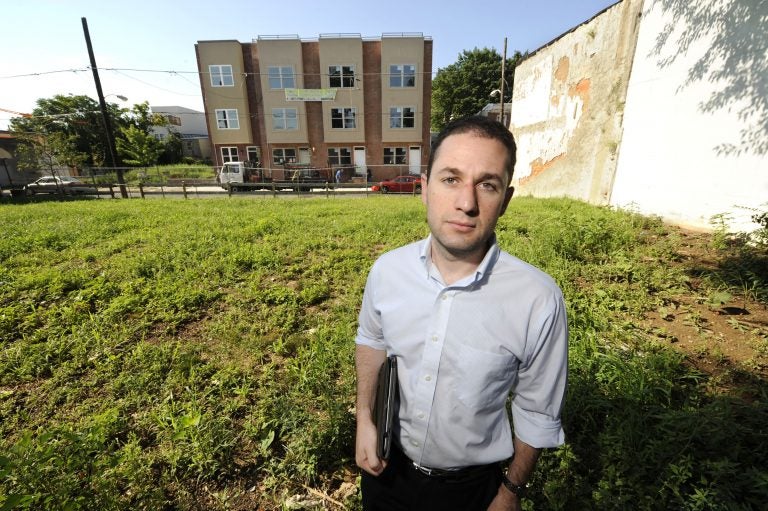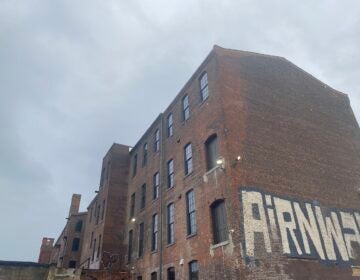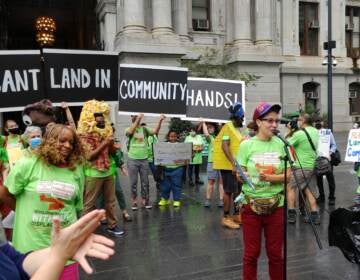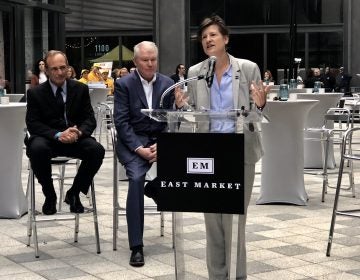Philly developers say numbers don’t ‘pencil’ out on city’s latest affordable housing scheme
A new voluntary inclusionary zoning bill is projected to bring $18 million to the Housing Trust over the next five years.

Ori Feibush, owner of ocfrealty in Philadelphia, stands on vacant lots on the 1700 block of Manton St in Point Breeze across the street from four 3-story townhouses his company built and is selling (Clem Murray/Inquirer)
This story originally appeared on PlanPhilly.
—
Ori Feibush may be one of the more controversial developers in Philadelphia, but few would argue about the one-time City Council candidate’s ability to get projects done in the city. Now the man who brought roof decks to Point Breeze is saying that the voluntary development incentives included in a new zoning bill designed to raise money for affordable housing won’t attract the interest needed to make the policy work.
“We found that there wasn’t any project we were looking at where it would work,” said Feibush, who has developed over 1,000 units of new housing in Philadelphia over the last decade. “Our office looks at more than a dozen properties a week, so we have 100 properties we reviewed from the last couple months and we went back to every one of those and it just didn’t pencil.”
That’s a problem because hopes are high for this new voluntary inclusionary zoning bill — now under consideration by the City Council. The legislation would incentivize developers to pay money into Philadelphia’s Housing Trust Fund in exchange for bonuses that allow larger, denser developments than would be otherwise permitted under zoning rules. The bill is projected to bring $18 million to the Housing Trust over the next five years.
That $18 million constitutes the difference between the $71 million affordable housing deal brokered at the beginning of the fall Council session and a smaller sum of $53 million, promised from the city’s general fund for the Housing Trust.
The bill is the work of Councilwoman Maria Quiñones-Sánchez, who initially tried to pass a mandatory inclusionary zoning bill. The development industry defeated that effort and the Councilwoman instead pushed forward a voluntary IZ bill as part of a larger affordable housing package.
That version, which real estate interests preferred, would have required developers to pay 1-to-2 percent of the cost of construction into the Housing Trust Fund in exchange for zoning bonuses that allowed denser and taller projects in many parts of the city not zoned for single-family housing. Developers were pleased with that number — Feibush thinks that doubling it to 2-to-4 percent still would have worked.
But during September negotiations with Mayor Jim Kenney’s team, the amount that developers would have to pay into the trust fund changed to terms preferred by the administration. The new terms require $25-to-$30 a square foot be paid into the trust fund in exchange for bonuses.
Feibush said that his team applied the proposed bonus to development sites located in low-rise, multi-family neighborhoods where requests to build taller and denser than regulations allow are common because of the opportunities to profit from a strong demand for housing. But even in these areas, the fees were too high, he said, especially because a developer can just turn to Philadelphia’s permissive Zoning Board of Adjustment to secure variances. The ZBA approved 92 percent of cases they heard last year, according to city data.
“You [developers] are paying for expediency and certainty,” said Feibush. “To get the right balance for these fees, you want it to be substantive enough to raise dollars for the trust fund but you don’t want it to be so substantive that a developer finds the difficult path of getting a traditional zoning variance to be more desirable.”
Feibush isn’t the only one who said the city’s math doesn’t add up. Real estate developers who build in neighborhoods farther from Center City’s hot market said the bonus structure wouldn’t accommodate developments where there is less potential to generate revenue from high rents or premium sales prices.
“The projects that would use the bonus cannot afford it as the current amendments have been proposed,” said Ryan Spak, a developer who focuses on West Philadelphia beyond University City.
Ken Weinstein, who focuses on restoring historic buildings in Germantown and Mt. Airy, said that it would make more sense if the payments were targeted to different markets. He suggested $10 a square foot for builders in these areas, with rates rising for bonuses in Center City and its ring of desirable neighborhoods.
“This is not geared towards middle neighborhoods,” said Weinstein. “With that specific number [$25-$30] a square foot, it will only make sense in neighborhoods where rents and revenues are highest. Not in middle neighborhoods, where profit margins are much smaller but construction costs are the same as in hot neighborhoods.”
Industry groups have long promoted voluntary inclusionary zoning and are generally supportive of the bill’s concept. But they too think the current numbers are off too.
“I don’t personally think that the new voluntary bonus structure works,” said Leo Addimando, vice-president of the Building Industry Association, which represents residential builders in the city. “I did like the previous version. We are working with Council on further revised incentives.”
Quiñones-Sánchez said that the complaints have been heard and the city is working on another iteration of the bill.
“We are working with the Administration on a legislative amendment to promote full utilization of a voluntary, accessible mixed-income housing bonus, tailored to the scale, size, and neighborhood of developments across Philadelphia,” Quiñones-Sánchez said.
Quiñones-Sánchez’s bill could be amended on the floor, in City Council chambers, as soon as Thursday.
WHYY is your source for fact-based, in-depth journalism and information. As a nonprofit organization, we rely on financial support from readers like you. Please give today.







